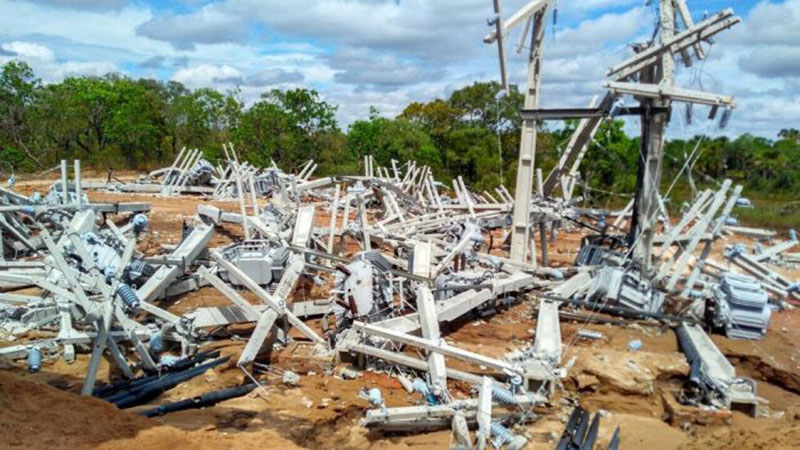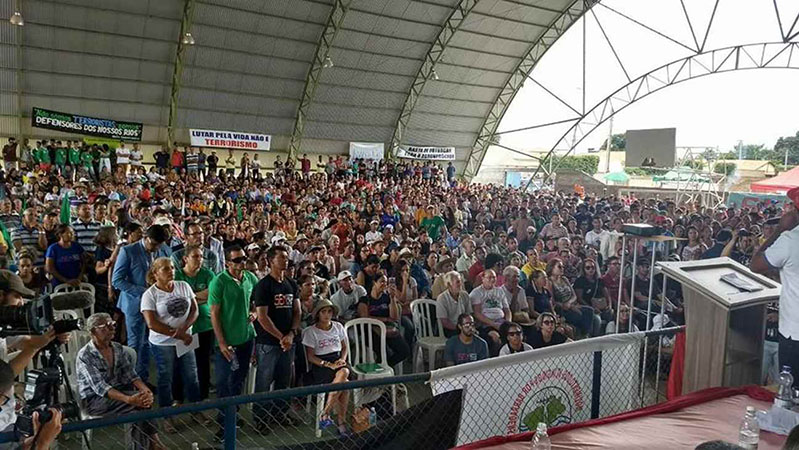
Fury of the masses after the uprising in November 2 in a facility for irrigation.
An important and combative popular uprising against the monopoly of water took place in the city of Correntina1 in November 2 this year, the media monopoly tried to criminalize the movement by calling it criminal and terrorist but, as a result, a bigger demonstration took place in November 11, where around ten thousand people from different neighbouring municipalities were on the streets of Correntina in solidarity to the struggle for the right to water and against the reduction of Arrojado river’s level because of the actions of the landlords and the consent of the environmental organs of the old State. “Igarashi go away!”2 and “we are not terrorists! We defend our rivers!” were slogans that marked the event. In December 1st around five thousand people attended to discuss the water problem in a public audience, and the people made denounces against the actions of the companies and the state concerning the water.

Public audience in December 1st
Also, in a city of Ceará in December 7, the people organized a roadblock with trunks and burning tires and occupied the construction site of the project to redirect the water of the lagoon afterwards. This project aims to supply the Industrial and Port Complex of Pecém and also two municipalities in the outskirts of Fortaleza city. It was denounced that the project doesn’t have an environmental impact study and violates the right to water for the local population.
The monopoly over the water is part of the problem of monopoly of land, as the landlords change the course of rivers to supply agribusiness that increases in the region since the 1970s but especially with the recent policies by the last governments to impulse the agribusiness occupation, counting with imperialism participation. This sharpens the contradiction between the people and latifundium, 156 conflicts concerning water involving 25.579 families were held in Bahia state in the period of 2002 until 2016, being 24 only in 2016, according to CPT3 data.
The dry Northeast has a total area of approximately 700 thousand square kilometres and approximately 23 million people (4 million landless peasants among them), one of the most populated semiarid regions between the tropics. The ground has a low capacity of storing water, the base is solid rock of gneiss or granite and has no space to store water and has a very shallow layer of soil over it, around 1 meter deep. There are some big cracks and openings that sometimes has water in a 60 meters depth, but most times does not worth to dig for it, because it is not proper for consumption.
But the geological and meteorological factors are not the only ones, nor the main reason for the restriction to water in the region. Most of the rivers are seasonal, the exception is São Francisco river, the biggest in the region, and very important for the peoples of Northeast. Most of the water in the region is being destined to agribusiness and mining activities, and the new project of transposition of the river, formulated by opportunism management of the state, were destined to deepen this situation.
It is clear that the situation the right to water is deeply linked to the right to land, with the struggle against latifundium and bureaucratic capitalism in service of imperialism, that restricts the people of the access to natural resources, steals all the natural resources from the people and leave only poverty behind. The struggle is sharpening and is each day clearer that only an Agrarian Revolution to seize all the lands of the landlords, a New Democracy Revolution to seize the big companies to serve the people’s interests and expel imperialism can secure that the peoples will have water, food and dignity.
1 – Correntina is a city in Bahia state, in the north-eastern region of Brazil.
2 – Igarashi is an agribusiness company which has Japanese capital that owns farms in the region.
3 – CPT – Comissão Pastoral da Terra – is a catholic organization that acts in the countryside of Brazil.
